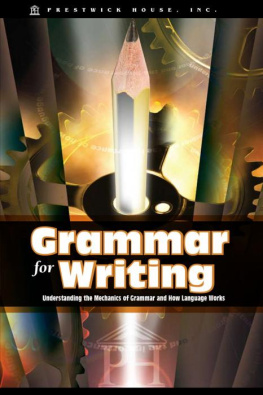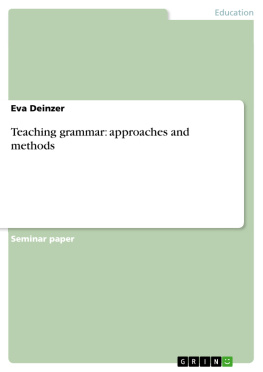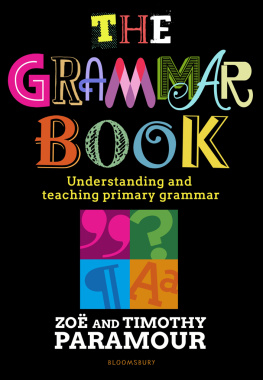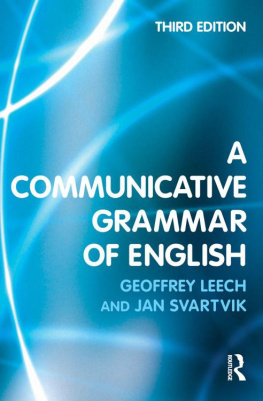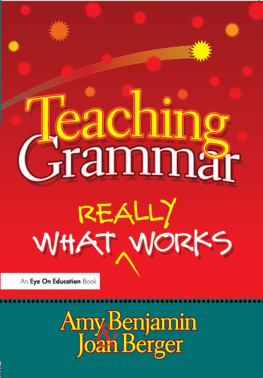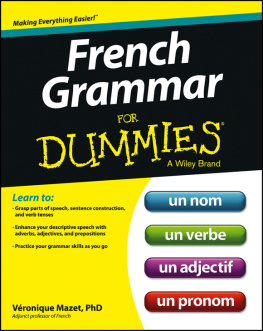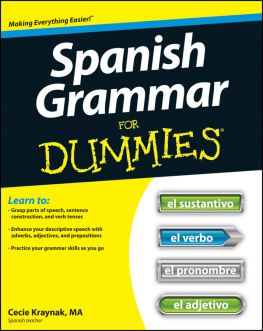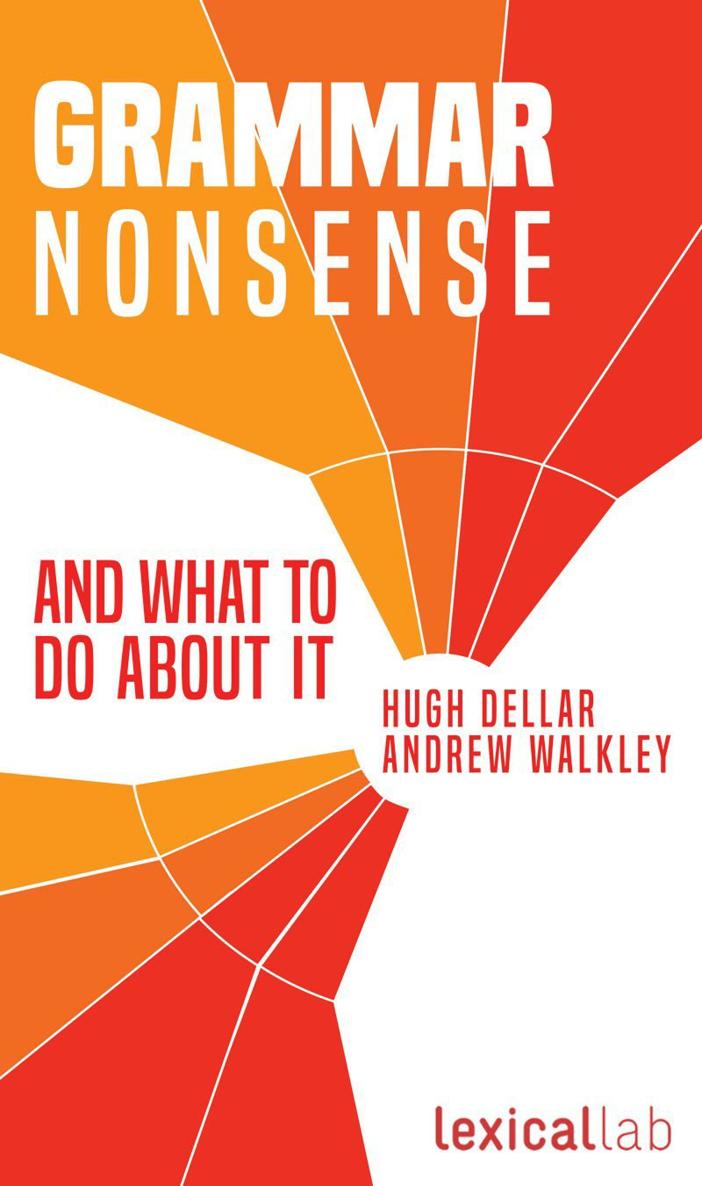Grammar Nonsense
and what to do about it
Andrew Walkley
Hugh Dellar
Copyright 2020 by Wayzgoose Press
All rights reserved.
No part of this book may be reproduced in any form or by any electronic or mechanical means, including information storage and retrieval systems, without written permission from the author, except for the use of brief quotations in a book review.
Contents
Introduction
Reported Speech
Reported Speech What We Miss Out
The Use of the Word Grammar
Stative Verbs
Relative Clauses
Relative Clauses Some Curiosities
Indirect Questions
Future Forms
The Syllabus for Beginners
Short Answers and Auxiliaries
The Present Continuous
Be Going
Verb Patterns
More Verb Patterns
Afterword if we must
Books and References
About the Authors
Introduction
At Lexical Lab, we promote what might be broadly seen as a lexical approach to teaching and learning. As a result, Ive quite regularly come up against certain grammar fanatics who falsely characterise this as meaning we are only teaching words, while also claiming we somehow lack the appropriate rigour needed for teaching grammar. These people often employ a very prescriptive view of grammar as right or wrong, and make statements like "you should never use less with a countable noun.
In contrast, a lexical approach to things utilises a descriptive way of seeing how language is used, a view thats been greatly aided in recent years by the availability of huge corpora data bases of used language and of computational tools that allow you to analyse these corpora. The analysis of real used language frequently proves that many prescriptive rules simply dont stand up to scrutiny.
The chapters in this book were originally written as blog posts on our website to highlight differences between the prescription and description of language. In this respect, there are plenty of forefathers (and mothers) to these chapters. For instance, I have seen Dave and Jane Willis talk about how would is far more common in talking about past habits than used Michael Lewis, the author of The Lexical would collect instances of native speakers breaking EFL rules by saying, to give just one example, and Michael McCarthy, who has produced various grammars of spoken English, apparently produced a similar dissection of reported speech to the one in this book some twenty years ago.
I guess ultimately this is the most annoying thing: the fact that many of these so-called rules were debunked years ago often by the same people mentioned above using rigorous corpora-based research that revealed quite how lexical much used language really is. Language is in fact full of fixed groupings of words and with vocabulary and grammar so thoroughly intertwined, they often impose constraints on one another. However, even today, when we write coursebooks, we have to constantly refer back to the old rules that have been passed down through the generations and which these days may be monitored / guarded by specialist grammar editors.
Editors play an absolutely vital part in producing good material that others can use, but they sure as hell can be annoying and highly conservative at times! It is these ongoing clashes with editors over the many years I have been writing coursebooks with my co-author Hugh Dellar that provide the backdrop to the blog posts that appear as chapters in this book. Hopefully, it also takes these chapters beyond what previous authors have done in pointing out of discrepancies between reality and published ELT rules. Thats because I have also tried to consider how these discrepancies come about in the first place; how they are perpetuated; how an unknowing student might perceive these rules; and how the rules play out within the methodologies of coursebook series, and how they are designed.
The chapters were, therefore, originally an opportunity to get things off my chest, and as a result, are often written in the style of the rant. However, in the end, I am also a teacher! And any good teacher will not just use a red pen and strike through things that are wrong (or they dont like!). Instead, theyll also point to alternatives and ways to improve the situation or at the very least, pose questions for students to consider. To that end, even the chapters about grammar nonsense contain at least some suggestions for English Language students and professionals.
Ive also included what I originally called grammar curiosities patterns and aspects of grammar that tend to go unnoticed and untaught in most ELT material. To be fair, there could have been more of these, but it turns out that rants are more fun to write, and the blog posts were initially written more for my own amusement than anything. Some of the same authors mentioned before have also written extensively on areas of grammar not covered in coursebooks. I might add to those a couple of others who have influenced me and who happen to be friends: Ivor Timmis and Ken Patterson. Ivor wrote a number of academic publications on grammar in spoken language. Ken (along with another friend Rebecca Sewell, who I worked with for many years) wrote a practice activity book on spoken grammar for DELTA publishing.
With each post I wrote, certain themes and fallacies emerged, such as:
the intrinsic ambiguity of language and the need for tolerance to that ambiguity;
the pressure to show development and the over-complication of rules;
the backwash of exams and error analysis;
the question of what the appropriate size of a grammar focus should be a McNugget, an olive, or something else?;
the pressure to treat all grammar in the same way in particular, the need for some kind of massed practice;
the transformation fallacy that the process in the speakers mind is to take base forms and change their grammar to create a different meaning or emphasis;
the repeated need to be presenting more grammar through providing examples and focusing on what students are saying or trying to say.
Finally, I should also acknowledge my friend, co-author and co-founder of Lexical Lab, Hugh Dellar. While I was the one who actually sat and wrote all the chapters in this book, they are also the fruit of many exasperated and entertaining (and generally ruder!) discussions Hugh and I have had over the years on these subjects. He has also been a keen and necessary editor of my writing. This should also be explanation for the drift between the use of we and I that youll see throughout the book.
Ultimately, whether you agree or disagree with these insights and comments on the original blog posts did suggest some didnt! what I hope you find here is someone who after thirty years still has a love of language, teaching and our industry despite all his and its flaws.
Andrew Walkley
Reported Speech
Is there anything that is more bizarrely and unnecessarily taught in ELT than reported speech? There have been many times when my heart has sunk as Ive faced the reported speech unit both as a teacher and as a writer. Ive often wanted to disappear into a dark corner and weep! And there have been more than a few occasions when my students have clearly felt pretty much the same after theyve discovered the lengthy list of rules, done endless transformations and tried and failed to fulfill my insane requirement that they repeat exactly what their partners had just told them two minutes ago following all rules previously looked at!



